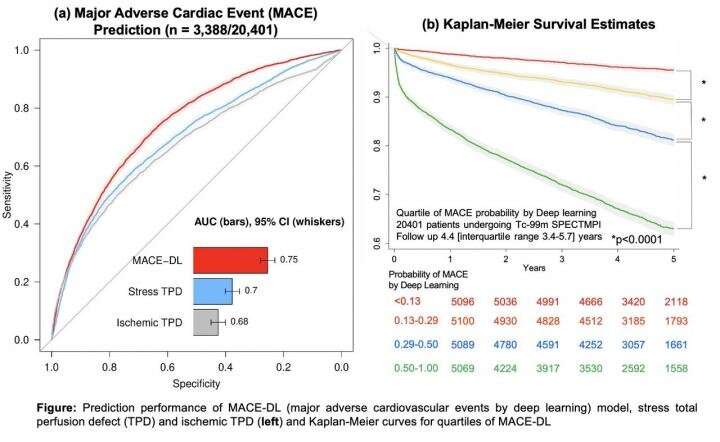#Deep learning with SPECT accurately predicts major adverse cardiac events

“#Deep learning with SPECT accurately predicts major adverse cardiac events”

An advanced artificial intelligence technique known as deep learning can predict major adverse cardiac events more accurately than current standard imaging protocols, according to research presented at the Society of Nuclear Medicine and Molecular Imaging 2021 Annual Meeting. Utilizing data from a registry of more than 20,000 patients, researchers developed a novel deep learning network that has the potential to provide patients with an individualized prediction of their annualized risk for adverse events such as heart attack or death.
Deep learning is a subset of artificial intelligence that mimics the workings of the human brain to process data. Deep learning algorithms use multiple layers of “neurons,” or non-linear processing units, to learn representations and identify latent features relevant to a specific task, making sense of multiple types of data. It can be used for tasks such as predicting cardiovascular disease and segmenting lungs, among others.
The study utilized information from the largest available multicenter SPECT dataset, the “REgistry of Fast myocardial perfusion Imaging with NExt generation SPECT” (REFINE SPECT), with 20,401 patients. All patients in the registry underwent SPECT MPI, and a deep learning network was used to score them on how likely they were to experience a major adverse cardiac event during the follow-up period. Subjects were followed for an average of 4.7 years.
The deep learning network highlighted regions of the heart that were associated with risk of major adverse cardiac events and provided a risk score in less than one second during testing. Patients with the highest deep learning scores had an annual major adverse cardiac event rate of 9.7 percent, a 10.2-fold increased risk compared to patients with the lowest scores.
“These findings show that artificial intelligence could be incorporated in standard clinical workstations to assist physicians in accurate and fast risk assessment of patients undergoing SPECT MPI scans,” said Ananya Singh, MS, a research software engineer in the Slomka Lab at Cedars-Sinai Medical Center in Los Angeles, California. “This work signifies the potential advantage of incorporating artificial intelligence techniques in standard imaging protocols to assist readers with risk stratification.”
Artificial intelligence can now predict long-term risks of heart attack and cardiac death
More information:
Abstract 50. “Improved risk assessment of myocardial SPECT using deep learning: report from REFINE SPECT registry”
Provided by
Society of Nuclear Medicine and Molecular Imaging
Citation:
Deep learning with SPECT accurately predicts major adverse cardiac events (2021, June 12)
retrieved 12 June 2021
from https://medicalxpress.com/news/2021-06-deep-spect-accurately-major-adverse.html
This document is subject to copyright. Apart from any fair dealing for the purpose of private study or research, no
part may be reproduced without the written permission. The content is provided for information purposes only.
If you liked the article, do not forget to share it with your friends. Follow us on Google News too, click on the star and choose us from your favorites.
For forums sites go to Forum.BuradaBiliyorum.Com
If you want to read more Like this articles, you can visit our Science category.




